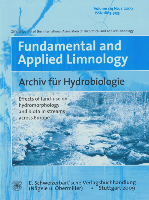
Fundamental and Applied Limnology
Scope & Guideline
Unveiling Aquatic Mysteries: A Platform for Freshwater Scholarship
Introduction
Aims and Scopes
- Freshwater Ecology:
Research in this area includes studies on the diversity, distribution, and interactions among freshwater organisms, such as zooplankton, macroinvertebrates, and fish, as well as their relationships with abiotic factors. - Ecosystem Functioning and Health:
Papers often explore ecosystem processes, such as nutrient cycling, decomposition, and food web dynamics, to assess the health and functioning of freshwater systems under various environmental pressures. - Impact of Anthropogenic Activities:
The journal addresses the effects of human activities, including agriculture, urbanization, and climate change, on freshwater ecosystems, highlighting the need for sustainable management and conservation strategies. - Invasive Species and Biodiversity:
Research on the impacts of invasive species on native freshwater fauna and flora is a key focus, providing insights into species interactions, community structure, and ecosystem resilience. - Water Quality Assessment and Pollution Monitoring:
Papers frequently discuss methodologies for assessing water quality and monitoring pollution, including the use of bioindicators and ecological modeling to understand the implications of contaminants.
Trending and Emerging
- Climate Change Impacts:
A significant number of recent studies focus on the effects of climate change on freshwater ecosystems, including shifts in species distributions, changes in community dynamics, and alterations in ecosystem services. - Microplastics and Contaminant Research:
There is an increasing emphasis on the ecological risks posed by microplastics and other contaminants, with studies exploring their distribution, effects on aquatic organisms, and implications for ecosystem health. - Functional Diversity and Traits:
Research increasingly emphasizes the functional traits of organisms and their roles in ecosystem processes, reflecting a paradigm shift towards understanding biodiversity in terms of ecological functions rather than just species richness. - Aquatic Invasive Species Dynamics:
There is a growing trend in investigating the interactions between native and invasive species, particularly how these interactions influence community structure and ecosystem resilience. - Ecosystem Management and Restoration Strategies:
Emerging themes include research on effective management and restoration strategies for freshwater ecosystems, addressing the need for practical applications of ecological research in conservation efforts.
Declining or Waning
- Traditional Water Chemistry Studies:
There has been a noticeable reduction in papers focusing solely on traditional water chemistry analyses without ecological context, suggesting a shift towards more integrative studies that combine chemical assessments with ecological and biological data. - Studies on Non-native Aquatic Plants:
Research specifically targeting the ecology of non-native aquatic plant species has decreased, potentially due to a broader focus on the interactions between invasive species and entire ecosystems. - Static Biodiversity Surveys:
The prevalence of static biodiversity assessments, which catalog species without examining their ecological roles or interactions, has diminished, indicating a trend towards more dynamic, process-oriented approaches in limnological research.
Similar Journals

Ecologia Aplicada
Exploring the Intersection of Ecology and Conservation.Ecologia Aplicada is a premier academic journal dedicated to advancing the understanding and application of ecological principles in varied environmental contexts. Published by UNIV NACIONAL AGRARIA LA MOLINA, the journal boasts a commitment to disseminating high-quality research that bridges the gap between theoretical concepts and practical applications in ecology, thereby contributing to sustainable development and environmental conservation practices in Latin America and beyond. With the ISSN 1726-2216 and E-ISSN 1993-9507, Ecologia Aplicada provides a platform for researchers, professionals, and students to publish and access impactful studies that address pressing ecological challenges. While the journal follows a rigorous editorial process, it is particularly notable for its Open Access initiatives, which aim to enhance the availability of crucial ecological research. The journal plays a vital role in enriching the academic community's discourse on ecological issues, encouraging innovative methodologies, and fostering collaborative approaches to ecological problem-solving.

International Journal of Limnology
Elevating Understanding of Freshwater BiodiversityThe International Journal of Limnology, published by EDP SCIENCES S A, is a cutting-edge journal dedicated to the field of aquatic sciences, with a strong emphasis on limnology—the study of inland waters. Headquartered in France, the journal serves as a vital resource for scholars and practitioners alike, aiming to advance the understanding of freshwater ecosystems and their management. With an e-ISSN of 2823-1465 and classified within the Q3 category of the 2023 Aquatic Science quartiles, it occupies a significant niche in academic research, ranking 150 out of 247 in Scopus listings. The journal’s open access policy ensures that research findings are widely disseminated, facilitating collaboration and innovation across global aquatic science communities. Published continuously from 2022 to 2024, the International Journal of Limnology aspires to contribute to sustainable practices and enhance ecological understanding, making it an essential publication for researchers, professionals, and students committed to the stewardship of aquatic resources.
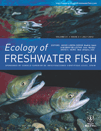
ECOLOGY OF FRESHWATER FISH
Unveiling the intricacies of freshwater habitats.ECOLOGY OF FRESHWATER FISH is a premier academic journal dedicated to advancing the understanding of freshwater fish ecology, published by Wiley in Denmark. With an ISSN of 0906-6691 and an E-ISSN of 1600-0633, the journal has been a critical platform for researchers since its inception in 1992, and will continue through 2024. It holds an impressive Q2 ranking in multiple categories including Aquatic Science and Ecology according to the latest quartiles, reflecting its significance and impact in these fields. The journal is well-regarded with Scopus rankings placing it in the top percentiles for ecology-related disciplines, showcasing its contributions to the understanding of aquatic ecosystems. Although it does not offer open access, the journal is highly valued for its rigorous peer-review process and its commitment to publishing original research that informs policy and conservation efforts. By bridging the gap between theory and practice, ECOLOGY OF FRESHWATER FISH remains a vital resource for students, professionals, and researchers engaged in the study of freshwater environments.
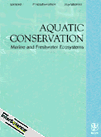
AQUATIC CONSERVATION-MARINE AND FRESHWATER ECOSYSTEMS
Exploring the depths of marine and freshwater ecosystems.AQUATIC CONSERVATION-MARINE AND FRESHWATER ECOSYSTEMS, published by WILEY, is a premier international journal dedicated to advancing the understanding of aquatic ecosystems and their conservation. With an impact factor reflecting its significant influence and a distinguished position in the Q1 quartile across key categories such as Aquatic Science, Ecology, and Nature and Landscape Conservation, this journal serves as an essential resource for researchers and professionals engaged in the study and protection of marine and freshwater environments. Covering a broad array of topics, from ecosystem management to conservation strategies, the journal encourages the dissemination of innovative research and interdisciplinary perspectives. Although it is not an open-access publication, this journal is esteemed for its rigorous peer-review process, facilitating a platform where vital research influences policy and practice in the aquatic sciences. Established in 1991, AQUATIC CONSERVATION continues to be a cornerstone in the academic exploration and safeguarding of aquatic ecosystems through to its converged years of 2024 and beyond, providing a critical lens for the future of environmental sustainability.
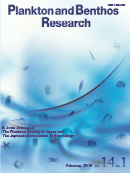
Plankton & Benthos Research
Fostering Insights into Ecological BalancePlankton & Benthos Research, published by the Plankton Society of Japan, serves as a pivotal platform in the fields of Aquatic Science, Ecology, and Oceanography. With its inception in 2006 and ongoing publication until 2024, this esteemed journal focuses on the complex interactions within aquatic ecosystems, emphasizing the significance of plankton and benthic organisms in maintaining ecological balance. Although it is categorized in the Q3 quartile across several disciplines, it continues to provide valuable insights and a forum for researchers to share innovative findings and methodologies. The journal is not currently open access, which ensures a layer of curator-driven content quality. Its impact, measured through Scopus rankings, showcases its role in fostering knowledge exchange among academics and professionals engaged in ecological and environmental studies. With an ISSN of 1880-8247 and E-ISSN 1882-627X, Plankton & Benthos Research invites contributions that enhance our understanding of the aquatic realm, establishing itself as a crucial resource for ongoing research and advancement in these essential fields.

LIMNETICA
Championing high-quality research in limnology.LIMNETICA is a prestigious academic journal dedicated to advancing the field of Aquatic Science, Ecology, and Water Science and Technology. Published by the Asociación Española de Limnología in Spain, this journal serves as a vital platform for researchers and professionals seeking to share their findings and insights from 1996 to 2024. With a commendable Q2 ranking in Ecology and notable Q3 rankings in Aquatic Science and Water Science and Technology, LIMNETICA emphasizes high-quality, peer-reviewed research that contributes to our understanding of freshwater ecosystems. Although currently not classified under Open Access, its rigorous indexing and Scopus rankings—positioning it in the top 64th percentile for Environmental Science—illustrate its impact in the scientific community. Researchers, students, and professionals are encouraged to engage with LIMNETICA to stay abreast of key developments and foster collaborative efforts in aquatic research.
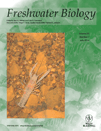
FRESHWATER BIOLOGY
Illuminating the Wonders of Freshwater BiologyFreshwater Biology is a premier academic journal dedicated to advancing the study of freshwater ecosystems and their biological diversity. Published by Wiley, this highly esteemed journal features an impact factor that reflects its influence within the field of aquatic science, maintaining a distinguished Q1 rank as per the 2023 standards. The journal is recognized for its comprehensive coverage of original research articles, review papers, and methodological advancements that address a range of topics from ecological interactions to conservation strategies in freshwater environments. With its extensive archive dating from 1971 to 2024, Freshwater Biology serves as an invaluable resource for researchers, professionals, and students looking to deepen their understanding of aquatic systems. Though it does not currently offer Open Access options, readers can access vital findings and contribute to the ongoing discourse in this critical area of study. Based in the United Kingdom, with its commitment to rigorous peer-review and high publication standards, Freshwater Biology continues to be a cornerstone publication in the field, enhancing our understanding of freshwater ecosystems and their management.
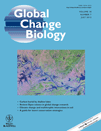
GLOBAL CHANGE BIOLOGY
Advancing Insights into Ecological TransformationsGLOBAL CHANGE BIOLOGY, published by Wiley, is a leading journal dedicated to advancing the scientific understanding of the relationships between biological systems and global environmental changes. With an impressive impact factor placing it in the Q1 category across multiple disciplines—including Ecology, Environmental Chemistry, and Global and Planetary Change—this journal is essential for researchers, professionals, and students aiming to stay at the forefront of this dynamic field. The journal has a rich history since its inception in 1995, continually providing a platform for high-quality research that informs policy and management practices worldwide. Although it is not open access, the journal remains a valuable resource for those committed to exploring the complexities of ecological and environmental change. With a Scopus ranking of #3 in Global and Planetary Change and #6 in both Ecology and Environmental Chemistry, GLOBAL CHANGE BIOLOGY continues to shape the dialogue on the pressing environmental challenges of our time.
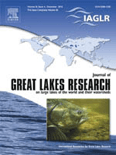
JOURNAL OF GREAT LAKES RESEARCH
Exploring the Depths of Aquatic ScienceJOURNAL OF GREAT LAKES RESEARCH is a prestigious academic journal published by Elsevier Science Ltd, focused on the vital field of aquatic sciences and ecology. With a long-standing history since its inception in 1975, this journal proudly ranks in the Q1 quartile across multiple categories, including Aquatic Science and Ecology, as of 2023, reflecting its significant contribution to the scientific community. The journal's impact is underscored by its impressive Scopus rankings, placing it within the top percentile of scholarly publications in related disciplines. Although it operates under a subscription model, its influence extends globally, serving as a critical resource for researchers and professionals dedicated to understanding the Great Lakes ecosystem and its broader ecological implications. As it converges into its future publications through 2024, JOURNAL OF GREAT LAKES RESEARCH remains an essential platform for innovative research that shapes environmental policy and promotes sustainable practices in aquatic environments.

INTERNATIONAL REVIEW OF HYDROBIOLOGY
Exploring the Depths of Ecology and EvolutionINTERNATIONAL REVIEW OF HYDROBIOLOGY is a prestigious academic journal dedicated to the dynamic fields of Aquatic Science and Ecology, Evolution, Behavior, and Systematics. Published by a reputable German publisher, this open-access journal ensures that groundbreaking research is readily available to a global audience, fostering collaboration and innovation within the scientific community. With an impressive impact factor and classification within the Q2 category of both Aquatic Science and Ecology, it ranks notably high on Scopus, standing at 211 out of 721 in Ecology and 84 out of 247 in Aquatic Science as of 2023. Covering a broad scope from fundamental hydrobiological research to applied ecological studies, the journal plays a crucial role in advancing knowledge and addressing contemporary environmental challenges. Researchers, professionals, and students will find INTERNATIONAL REVIEW OF HYDROBIOLOGY to be an essential resource for informing their own work and contributing to the global dialogue on aquatic systems and their conservation.